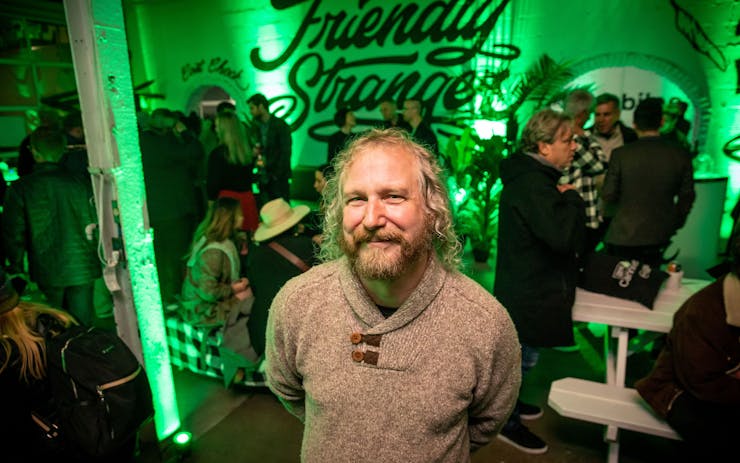We chat with some of the most prominent figures in Canadian cannabis about the highlights and lowlights of the first year of legalization. In the first installment of this series we chat with Robin Ellins of the Friendly Stranger.
See more in this series:
- Part 1:Robin Ellins, Friendly Stranger
- Part 2:Bruce Linton, formerly Canopy Growth
- Part 3:Jodie Emery, Princess of Pot
- Part 4:Abi Roach, Hotbox Café
As Canada celebrated its first anniversary of legalization on Oct. 17, 2019, Toronto’s Friendly Stranger cannabis accessories store marked a quarter of a century in business.
First opened on July 7, 1994, the store was originally located on the second floor at 226 Queen Street West. Fast forward to today and the store still exists, now located at street level at 241 Queen Street West and surrounded by legal cannabis stores, something that Friendly Stranger proprietor Robin Ellins wholeheartedly welcomes.
Having obtained capital of $10 million from a privately-held firm, there are plans for up to 50 stores—and that’s just in Ontario. Ellins hopes to also add cannabis to the store’s offerings to accompany the wide array of books, bongs, papers, and accessories.

Photo by Jesse Milns/Leafly
Ellins, when asked if he’s surprised that cannabis is finally legal, shares that he “didn’t realize it would take 25 years but the whole purpose of [the Friendly Stranger’s] existence was to make cannabis legal and it came from the fact that I got in trouble for cannabis possession and got a record.”
“When you look at the history of where we come from, back in 1994 the store actually came out of our activism. We worked with the Canadian Hemp Association in their struggle to legalize hemp, so after that we tried to figure out how to legalize cannabis.”The store actually came out of our activism.
Are there any consumer trends that the store has seen recently?
“When we first started out, it was definitely a younger group—and others—but for the most part 19 to 25 years old. There was always looking over your shoulder when talking about cannabis at the time, and this was a safe space, or sanctuary to have a conversation about a culture that should be legitimate.”
“As medicinal cannabis came online, that helped bring another group online. Since legalization, we really didn’t think that the law had anything to do with the choice of whether people smoke or not. There were a lot of people [who] didn’t try it because it [was] illegal. We see people who are 35, haven’t smoked cannabis before, and they’re looking for knowledge and we can educate them.”
The age range of customers has really increased, Ellins says, and the store sees a lot more of the aging population.
Toronto’s first licensed cannabis retailer The Hunny Pot opened for business right across the street in April. How has that been for business?
“It’s interesting because it was really hard for us for a while,” says Ellins, noting that prior to legalization there were more than 100 illegal dispensaries operating in Toronto, and the Friendly Stranger was the number one cannabis result on Google.
“People would come in but [didn’t] check to see that [the store doesn’t] (yet) sell cannabis.
“We had all these tourists and people asking for cannabis and finding out we didn’t have cannabis. [We] didn’t have anywhere to send people because it was illegal—so it was grinding for a few years. I even lost staff over that.”
When the original cannabis retail store lottery happened and Hunny Pot was the first store to open in all of Toronto earlier this year, Ellins said that they opened across the street as “a kind of a nod to us.”
They have told Ellins “flat out” they’re not interested in selling cannabis accessories, and they just want to sell cannabis.

Photo by Jesse Milns/Leafly
Ellins doesn’t see them as competition, and that it solves a problem for him: “They have a few [accessories] in their shop but it’s not their focus. Now we have the answer for those people just looking for cannabis and that’s taking pressure off, and they’ve sent people to us so it’s been a mutually rewarding happening.”
Ellins takes issue with the lottery system the Ontario government has set, and he says it has stymied his goal to open up 50 cannabis-selling shops in the province.
However, business at the flagship store on Queen Street West in Toronto has barely slowed down, and with 50 stores on the horizon, the future is promising for the company, which recently re-established itself as a holding company.






